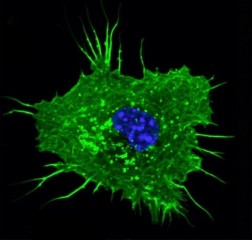Understanding the Body’s Response to Worms and Allergies

The University of Manchester A dendritic cell
In a paper published in Nature Communications, Professor Andrew MacDonald and his team at the Manchester Collaborative Centre for Inflammation Research discovered a new way that immune cells control inflammation during worm infection or an allergic response like asthma. It’s important to understand how this type of inflammation is controlled as it can be very damaging and in some cases lead to long term conditions.
Professor MacDonald explains the reasons behind his work: “Although both worm infections and allergies exert a devastating global impact and lack effective vaccines or refined treatments, basic knowledge of the key cell types and mediators that control immunity and inflammation against either condition is currently limited.”
To study how inflammation is controlled the team looked at dendritic cells – a particular type of cell in the immune system that is a vital first responder to worms or allergies. The main function of dendritic cells is to recognise infection and switch on channels to combat it, including inflammation.
What isn’t known is precisely how immune cells switch on the kind of inflammation found during worm infections or allergies.
Professor MacDonald and his team studied dendritic cells in the lab and animal models to see how they were activated by parasitic worms, or lung allergens such as house dust mites.
They found that a particular protein called Mbd2 is central to the ability of dendritic cells to switch on inflammation in these kinds of settings. When the protein was removed it resulted in very different cells with a dramatically impaired ability to switch on inflammation.
The team also identified that Mbd2 is able to influence a wide range of genes important for multiple aspects of dendritic cell function without altering their DNA sequence, meaning that Mbd2 is an ‘epigenetic’ regulator.
Professor MacDonald explains: “For the first time we have identified that this protein is a key controller of dendritic cells during inflammation against parasitic worms or allergens. It’s an important step, as all inflammation is not identical, and scientists try to understand which specific cells and chemicals are more important in the body’s response to particular infections. In the past, medicines have had a broad approach, affecting all aspects of a condition rather than being targeted. In the future it might be possible to create medicines that control the inflammation caused specifically by an allergy or a parasitic worm, rather than by a virus such as a common cold.”
Professor MacDonald continues: “With billions of people affected by both allergies and worm infections around the world it is vital that we develop better methods of treatment. It’s also important to tackle the inflammation caused by these conditions, as it has been shown to play a role in the development of longer term diseases such as asthma.”
Contact Information
Morwenna Grills
Media Relations Officer
morwenna.grills@manchester.ac.uk
Phone: +44 (0)161 275 2111
Mob: +44 (0)7920 087466
Media Contact
All latest news from the category: Health and Medicine
This subject area encompasses research and studies in the field of human medicine.
Among the wide-ranging list of topics covered here are anesthesiology, anatomy, surgery, human genetics, hygiene and environmental medicine, internal medicine, neurology, pharmacology, physiology, urology and dental medicine.
Newest articles

Machine learning algorithm reveals long-theorized glass phase in crystal
Scientists have found evidence of an elusive, glassy phase of matter that emerges when a crystal’s perfect internal pattern is disrupted. X-ray technology and machine learning converge to shed light…

Mapping plant functional diversity from space
HKU ecologists revolutionize ecosystem monitoring with novel field-satellite integration. An international team of researchers, led by Professor Jin WU from the School of Biological Sciences at The University of Hong…

Inverters with constant full load capability
…enable an increase in the performance of electric drives. Overheating components significantly limit the performance of drivetrains in electric vehicles. Inverters in particular are subject to a high thermal load,…





















